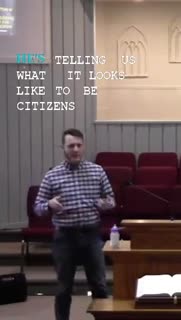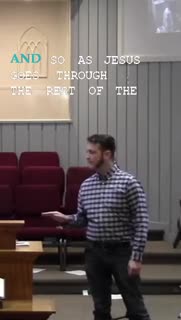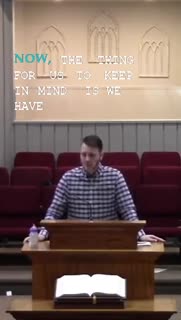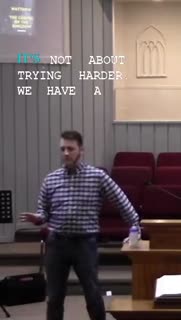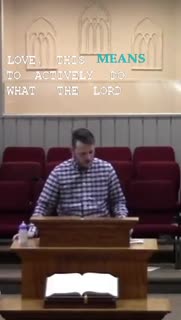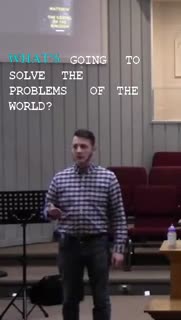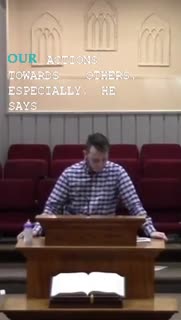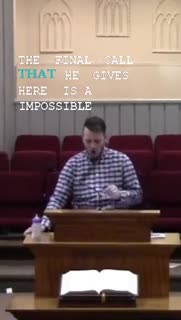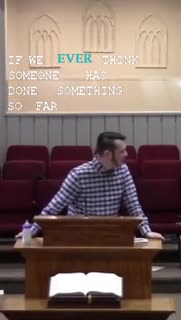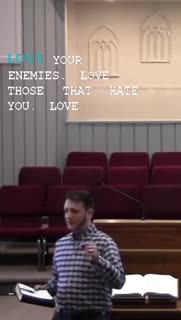Living as Citizens of God's Kingdom: A Radical Call
Devotional
Sermon Summary
Bible Study Guide
Sermon Clips
1) "He's telling us what it looks like to be citizens of his kingdom. He's preparing his followers to understand what God has called them to as believers in Jesus, because as we talk about Matthew, this gospel of the kingdom, we live in this balance of recognizing that the kingdom is here, but the kingdom is not here. Jesus teaches that the kingdom is in the hearts of those who believe in him, those who follow him, but he also teaches that there is a kingdom that is coming that he will establish on this earth, where he will rule and he will reign, and that kingdom is not here yet." [01:28] (43 seconds)
2) "And so as Jesus goes through the rest of the Sermon on the Mount, he is trying to help the people to understand. He's trying to help us to understand how we've been called to live and be as citizens of the kingdom. He talked about anger. You've heard that it was said of old, you shall not murder. Whoever murders will be liable to judgment. But I say to you that everyone who's angry with his brother will be liable to judgment. Whoever insults his brother will be liable to the council. And whoever says you fool will be liable to the hell of fire." [07:34] (30 seconds)
3) "Now, the thing for us to keep in mind is we have no ability to live this out on our own. In the gospel of John, Jesus talking to the apostles is saying that he must go. The disciples. The disciples don't want him to go. He's saying, no, no, it is needful that I go. Because unless I go, the spirit cannot come. Because when Jesus, after his death, burial, and resurrection, 40 days later, when he ascended into heaven, he told them to go and wait. They went and they waited. And on the day of Pentecost, in Acts chapter number two, what happened? The Holy Spirit came and indwelt those in the upper room." [10:42] (50 seconds)
4) "It's not about trying harder. We have a responsibility, absolutely. But it's not about trying harder under your own abilities. It's about following the Holy Spirit and being obedient to what he has called us to, even when it is contrary to our nature, our culture, and sometimes even the way we as a church operate. he just say that? Read with me, starting verse number 43. You have heard that it was said, you shall love your neighbor and hate your enemy. But I say to you, love your enemies and pray for those who persecute you so that you may be sons of your father who is in heaven." [12:19] (51 seconds)
5) "Love, this means to actively do what the Lord prefers with him as the one who's doing it, not you. That's what this word is. This is the word agape. In fact, verb form of agape. This is a love that prefers what God does and actively does it, recognizing it's him that's doing it, not you. So he says, you've heard it said, love your neighbor. Your neighbor means someone who is nearby. But Jesus, as he began to teach on this word, demonstrated that the word neighbor means anyone of any race, any religion that you either come in contact with or have the possibility of coming in contact with." [23:54] (48 seconds)
6) "What's going to solve the problems of the world? Not different political systems, not different political parties. What's going to save this world is the person of Jesus Christ changing the hearts of men. That is the only thing that will deliver this world is the person of Jesus Christ. How do people know about the love of Jesus Christ? How do people know about what Christ has done when we say, I don't care about the past. I don't care about the cultural preferences. I don't care about any of the junk that society says. I don't even care about the garbage that the church has promoted. For decades, I'm going to love my enemy because that's what Jesus said to do." [27:06] (44 seconds)
7) "Our actions towards others, especially, he says here, our actions towards our enemies are a reflection of whether or not we belong to God. We miss this so often. We say, oh, we're the sons of God. We're the children of God. We're blah, blah, blah, blah, blah. But if we don't live like it, if we don't live like it, it demonstrates that there's a disconnect somewhere either in our thinking or in what we really believe. Because Jesus says, you love me, you keep my commandments. Guess what? This right here is the command." [31:44] (35 seconds)
8) "The final call that he gives here is a impossible call, yet it is the culmination of everything Jesus has said up to this point, which again points us back to the need for Christ and the need for the Holy Spirit, because you cannot, I cannot be perfect. It is impossible. This word perfect that's used here means to be complete in all of its part, to be fully grown. It specifically has to do with the completeness of a Christian's character. Be complete as your heavenly father is complete." [35:18] (42 seconds)
9) "If we ever think someone has done something so far beyond the ability for us to forgive, we need to take a step back and look at Christ. There is nothing, there is nothing anyone on earth could ever do to you that is worse than what you have done through your sin and rebellion against God. Nothing. Now, does that mean forgiveness is easy? No. But if we are unwilling to forgive, if we are unwilling to love, we need to take a step back and recognize what he has done for us." [38:41] (34 seconds)
10) "Love your enemies. Love those that hate you. Love those that you hate. Because love, love is from God. And we're called to show that to other people. Sermon on the Mount is not some easy feel-good message for us. When Jesus delivers this Sermon on the Mount, he's saying, listen, I have called you to be different from the rest of the world. I have changed you so that you will be different." [42:07] (38 seconds)
Ask a question about this sermon
2) "And so as Jesus goes through the rest of the Sermon on the Mount, he is trying to help the people to understand. He's trying to help us to understand how we've been called to live and be as citizens of the kingdom. He talked about anger. You've heard that it was said of old, you shall not murder. Whoever murders will be liable to judgment. But I say to you that everyone who's angry with his brother will be liable to judgment. Whoever insults his brother will be liable to the council. And whoever says you fool will be liable to the hell of fire." [07:34] (30 seconds)
3) "Now, the thing for us to keep in mind is we have no ability to live this out on our own. In the gospel of John, Jesus talking to the apostles is saying that he must go. The disciples. The disciples don't want him to go. He's saying, no, no, it is needful that I go. Because unless I go, the spirit cannot come. Because when Jesus, after his death, burial, and resurrection, 40 days later, when he ascended into heaven, he told them to go and wait. They went and they waited. And on the day of Pentecost, in Acts chapter number two, what happened? The Holy Spirit came and indwelt those in the upper room." [10:42] (50 seconds)
4) "It's not about trying harder. We have a responsibility, absolutely. But it's not about trying harder under your own abilities. It's about following the Holy Spirit and being obedient to what he has called us to, even when it is contrary to our nature, our culture, and sometimes even the way we as a church operate. he just say that? Read with me, starting verse number 43. You have heard that it was said, you shall love your neighbor and hate your enemy. But I say to you, love your enemies and pray for those who persecute you so that you may be sons of your father who is in heaven." [12:19] (51 seconds)
5) "Love, this means to actively do what the Lord prefers with him as the one who's doing it, not you. That's what this word is. This is the word agape. In fact, verb form of agape. This is a love that prefers what God does and actively does it, recognizing it's him that's doing it, not you. So he says, you've heard it said, love your neighbor. Your neighbor means someone who is nearby. But Jesus, as he began to teach on this word, demonstrated that the word neighbor means anyone of any race, any religion that you either come in contact with or have the possibility of coming in contact with." [23:54] (48 seconds)
6) "What's going to solve the problems of the world? Not different political systems, not different political parties. What's going to save this world is the person of Jesus Christ changing the hearts of men. That is the only thing that will deliver this world is the person of Jesus Christ. How do people know about the love of Jesus Christ? How do people know about what Christ has done when we say, I don't care about the past. I don't care about the cultural preferences. I don't care about any of the junk that society says. I don't even care about the garbage that the church has promoted. For decades, I'm going to love my enemy because that's what Jesus said to do." [27:06] (44 seconds)
7) "Our actions towards others, especially, he says here, our actions towards our enemies are a reflection of whether or not we belong to God. We miss this so often. We say, oh, we're the sons of God. We're the children of God. We're blah, blah, blah, blah, blah. But if we don't live like it, if we don't live like it, it demonstrates that there's a disconnect somewhere either in our thinking or in what we really believe. Because Jesus says, you love me, you keep my commandments. Guess what? This right here is the command." [31:44] (35 seconds)
8) "The final call that he gives here is a impossible call, yet it is the culmination of everything Jesus has said up to this point, which again points us back to the need for Christ and the need for the Holy Spirit, because you cannot, I cannot be perfect. It is impossible. This word perfect that's used here means to be complete in all of its part, to be fully grown. It specifically has to do with the completeness of a Christian's character. Be complete as your heavenly father is complete." [35:18] (42 seconds)
9) "If we ever think someone has done something so far beyond the ability for us to forgive, we need to take a step back and look at Christ. There is nothing, there is nothing anyone on earth could ever do to you that is worse than what you have done through your sin and rebellion against God. Nothing. Now, does that mean forgiveness is easy? No. But if we are unwilling to forgive, if we are unwilling to love, we need to take a step back and recognize what he has done for us." [38:41] (34 seconds)
10) "Love your enemies. Love those that hate you. Love those that you hate. Because love, love is from God. And we're called to show that to other people. Sermon on the Mount is not some easy feel-good message for us. When Jesus delivers this Sermon on the Mount, he's saying, listen, I have called you to be different from the rest of the world. I have changed you so that you will be different." [42:07] (38 seconds)
